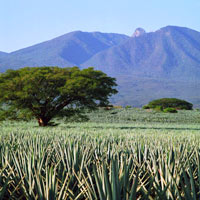Latin America & the Caribbean
Mexico

- © UNESCO/C.Torres/Camera Nacional de la Industria Tequilera
- Agave landscape, Sierra de Manantlán Biosphere Reserve
The country hosts a UNESCO National Office in Mexico City.
Mexico is involved in a great variety of projects dealing with watershed or coastal management, biosphere reserves, oceans, basic sciences and more. It is participating in a large number of earth sciences research projects.
It is directly concerned by a remote sensing project that aims to help protect biodiversity in the Mesoamerica Biological Corridor. The project uses space technologies to assess the current overall status of conservation of the ecosystem as a whole, using UNESCO sites as main pilot samples. The environmental assessment will contribute to implementation of the Convention on Biological Diversity, which aims to reduce biodiversity loss by 2010.
Below you can access the projects that are currently being implemented in the country within the framework of UNESCO’s Natural Sciences Sector.
Freshwater
- International Hydrological Programme-Latin America and the Caribbean (IHP-LAC) Working group on snow and ice More
- Hydrology for the Environment, Life and Policy programme (HELP) projects:
People, Biodiversity and Ecology
- UNESCO and the European Space Agency (ESA) Project: Using Space Technologies to Assist Mesoamerica with the Biological Corridor More
- Biosphere Reserves (WNBRs)
- UNESCO Chair in Habitat and socially sustainable development , established in 1998 at the Instituto Tecnológico y de Estudios Superiores de Occidente (ITESO) More
Oceans
- Pacific Tsunami Warning and Mitigation System (ICG/PTWS)
- Intergovernmental Oceanographic Commission (IOC) Sub-Commission for the Caribbean and Adjacent Regions (IOCARIBE)
Earth Sciences
- Seismic Microzoning of Latin American Cities (IGCP, Project 487)
- The role of Holocene environmental catastrophes in human history (IGCP, Project 490)
- The Rheic Ocean: Its origin, evolution, and correlatives (IGCP, Project 497)
- Volcano collapse and fault activity – ‘Young Scientists Project’ (IGCP, Project 508)
- Global Comparison of Volcanic-hosted Massive Sulphide Districts (IGCP, Project 502)
- Marine and Non-marine Jurassic: Global correlation and major geological events (IGCP, Project 506)
- Neoproterozoic Ice Ages (IGCP, Project 512)
- Karst Aquifers and Water Resources (IGCP, Project 513)
- Hydrogeology, Hydrochemistry and Management of Coastal Aquifers on the Atlantic Coast of South America (IGCP, Project 519)
- Global Ground Water Network GROWNET (IGCP, Project 523)
Basic Sciences
- UNESCO Chair in Bioethic and Clinical Medicine, established in 2007 at Instituto Nacional de Enfermedades Respiratorias, México D.F. More
Coasts and Small Islands
- Caribbean Coastal Marine Productivity Program (CARICOMP): sustaining coastal biodiversity benefits and ecosystem services
Remote Sensing
- UNESCO and the European Space Agency (ESA) Project: Using Space Technologies to Assist Mesoamerica with the Biological Corridor More

